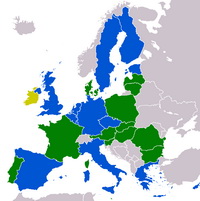Lisbon Treaty: Czechs Move Closer to Ratification
Tory leader David Cameron promises to say "later this week" what his policy is on a Lisbon Treaty referendum after the Czechs moved closer to ratification.

In 2007, Mr Cameron made a "cast iron" guarantee to hold a referendum on any treaty that emerged from EU talks.
But he has now said that if the treaty passes into law, as it is expected to, it will "create a new situation".
Mr Cameron is facing calls to hold a post-ratification treaty if the Tories win the next election.
Eurosceptics have accused Mr Cameron of reneging on a promise, made in a 2007 article for The Sun newspaper, in which he said: "Today, I will give this cast-iron guarantee: If I become PM a Conservative government will hold a referendum on any EU treaty that emerges from these negotiations," BBC News reports.
Meanwhile, the new European Union Lisbon Treaty could enter into force as early as Dec. 1, provided that the Czech president signs it, the Swedish government, which holds the EU rotating presidency until year-end, said Tuesday.
"Now all that remains is the Czech President's signature," Sweden said in a statement. "Provided that the treaty is signed in November, it can enter into force on 1 December 2009," it added.
Earlier Tuesday, Czech constitutional justices dismissed the complaint by a group of Euroskeptic senators that the Lisbon Treaty violates the country's constitution.
Czech President Vaclav Klaus has withheld signing until the court ruling, arguing that the document strips the Czech Republic of its sovereignty, The Wall Street Journal reports.
It was also reported, the court in Brno, which has spent the past week considering a petition by 17 Eurosceptic Czech senators, said this morning that the Lisbon treaty could proceed. It did not, said the chief judge Pavel Rychetsky, contravene the letter or the principles of the country's constitution.
President Vaclav Klaus, who opposes the treaty, has promised to sign the ratification documents if the court agreed that the Lisbon accord did not impinge upon Czech sovereignty.
The other 26 European Union countries have all ratified the treaty. Only a flick of President Klaus's pen now stands in the way of the treaty, which among other things provides for a European president and a high representative in charge of EU foreign policy.
The court's decision came as it emerged that David Cameron, the Tory leader, was planning to drop his party's pledge to hold a referendum on the treaty, Times Online reports.
Subscribe to Pravda.Ru Telegram channel, Facebook, RSS!



